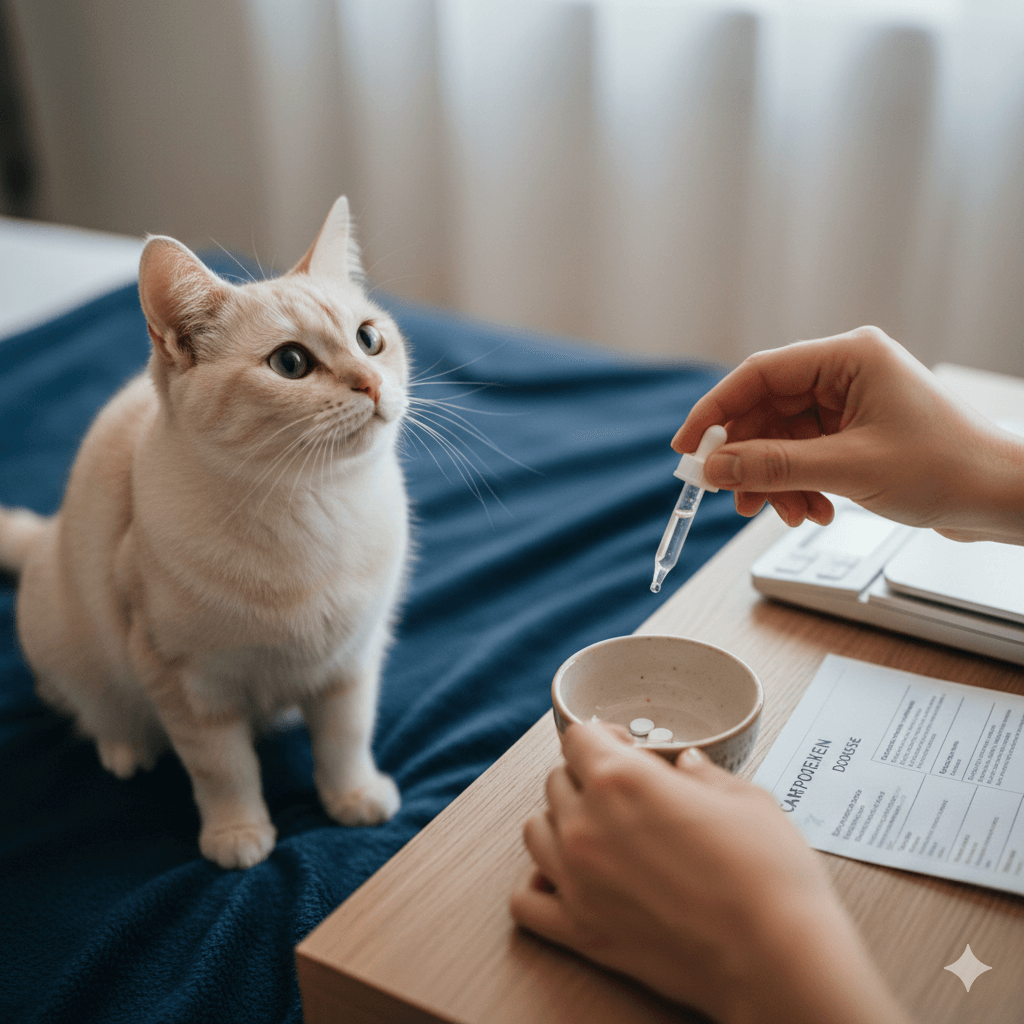How to Calm a Cat Before the Vet: A Stress-Free Guide for Pet Owners
Visiting the vet is an essential part of keeping your cat healthy, but let’s face it—most cats don’t exactly enjoy the experience. From the dreaded carrier to the unfamiliar smells and sounds of the clinic, vet visits can be stressful for both you and your furry friend. However, there are effective ways to calm your cat before the vet and make the process smoother for everyone involved. With a little preparation and understanding, you can reduce your cat’s anxiety and ensure they feel as comfortable as possible.
In this blog post, we’ll explore practical tips, tricks, and strategies to help you keep your cat calm before their next vet appointment. Let’s dive in and turn those stressful trips into manageable experiences!
Why Do Cats Get Stressed Before Vet Visits?
Understanding why cats become anxious before vet visits is the first step toward calming them. Cats are creatures of habit, and any disruption to their routine can trigger stress. Here are some common reasons for their anxiety:
Fear of the Carrier
Many cats associate their carrier with unpleasant experiences, such as vet visits or being confined.Unfamiliar Environments
The sights, sounds, and smells of the vet clinic can overwhelm a cat’s sensitive senses.Handling by Strangers
Cats may feel threatened when touched or examined by unfamiliar people, including the vet.Change in Routine
Even small changes, like altering feeding times or travel plans, can unsettle a cat.Previous Negative Experiences
If a past vet visit was traumatic, your cat may remember and anticipate similar stress.
Recognizing these triggers can help you address them proactively. By preparing your cat in advance, you can minimize their anxiety and create a more positive experience.
Tips to Calm Your Cat Before the Vet Visit
Calming your cat before the vet requires patience and preparation. Here are some practical strategies to help your feline friend stay relaxed:
Introduce the Carrier Early
Leave the carrier out at home with treats and toys inside so your cat associates it with positive experiences.Use Familiar Scents
Place a blanket or item with your scent inside the carrier to provide comfort during the trip.Practice Short Trips
Take your cat on short car rides to familiarize them with travel and reduce fear of the carrier.Create a Calm Environment
Speak softly and avoid sudden movements to keep your cat feeling secure before leaving for the vet.Use Calming Products
Consider using pheromone sprays or diffusers, such as Feliway, to soothe your cat’s nerves.
These techniques can significantly reduce your cat’s stress levels and make the vet visit less daunting. Consistency is key—start preparing well in advance for the best results.
Check this guide 👉Can I Take a Stray Cat to the Vet for Free? Best 7 Tips!
Check this guide 👉Cat Antibiotics Without Veterinary Guidance: Best 7 Tips!

Ways to Calm Your Cat Before the Vet | Benefits of Each Method |
|---|---|
Introduce the carrier early | Reduces fear of confinement and travel |
Use familiar scents | Provides comfort and a sense of security |
Practice short trips | Helps your cat get used to car rides |
Create a calm environment | Minimizes additional stressors at home |
Use calming products | Soothes anxiety through natural pheromones |
What to Do During the Vet Visit to Keep Your Cat Calm
Once you’re at the vet, there are several things you can do to ensure your cat remains as relaxed as possible. Here’s how to support your cat during the appointment:
Keep the Carrier Covered
Drape a light blanket over the carrier to block out overwhelming sights and sounds.Stay Calm Yourself
Your cat can pick up on your emotions, so staying relaxed helps them feel more at ease.Bring Favorite Items
Pack a favorite toy or treat to distract and comfort your cat during the visit.Ask for a Quiet Waiting Area
Request a quiet corner or separate room to wait, away from other animals and noise.Reward Good Behavior
Praise and reward your cat with treats or gentle petting for staying calm during the exam.
By implementing these strategies, you can create a more peaceful experience for your cat at the vet. Small gestures can go a long way in reducing their stress.
After the Vet Visit: Helping Your Cat Recover
After the vet visit, your cat may still feel stressed or unsettled. Here’s how to help them decompress and return to their normal routine:
Provide a Safe Space
Let your cat retreat to a quiet, familiar area where they feel secure.Offer Comfort Food
Serve their favorite meal or snack to reassure them and restore normalcy.Avoid Overstimulation
Give your cat time to relax without forcing play or interaction.Monitor Their Behavior
Watch for signs of lingering stress, such as hiding or changes in appetite.Reintroduce Routine Gradually
Ease back into regular activities, like feeding and playtime, to help them readjust.
Helping your cat recover after the vet visit ensures they feel safe and loved. With time, they’ll bounce back and regain their usual confidence.
Common Mistakes to Avoid When Calming Your Cat Before the Vet
Even with the best intentions, pet owners can sometimes make mistakes that increase their cat’s stress before a vet visit. Avoiding these pitfalls can help ensure a smoother experience for both you and your feline companion. Here are some common mistakes to watch out for:
Waiting Until the Last Minute to Introduce the Carrier
Springing the carrier on your cat moments before leaving can heighten their anxiety.Skipping Practice Trips
Failing to acclimate your cat to car rides can make the journey to the vet more stressful than necessary.Using Harsh or Loud Voices
Raising your voice or acting impatient can escalate your cat’s fear and make them less cooperative.Neglecting Familiar Scents
Forgetting to include comforting items like blankets or toys can leave your cat feeling exposed and vulnerable.Overloading the Carrier
Adding too many unfamiliar objects to the carrier can overwhelm your cat instead of calming them.
By avoiding these mistakes, you can create a more positive and stress-free experience for your cat. Thoughtful preparation is key to success.
Fun Facts About Cats and Stress Relief
Cats have unique ways of coping with stress, and understanding these behaviors can help you better support them during vet visits. Here are some interesting facts about cats and how they handle anxiety:
Purring as a Self-Soothing Mechanism
Cats often purr when they’re stressed, using the vibrations to calm themselves.Hiding Is a Natural Response
Retreating to a safe space is a survival instinct that helps cats feel protected during uncertain times.Routine Is Essential for Comfort
Cats thrive on predictability, and disruptions to their routine can cause significant stress.Scent Marking Builds Security
Rubbing their face on objects leaves scent markers that provide reassurance in unfamiliar environments.Play Can Reduce Anxiety
Engaging in play releases endorphins, which can help alleviate stress and improve mood.
These fun facts highlight the importance of creating a secure and predictable environment for your cat. By catering to their natural behaviors, you can help them feel more at ease.
Signs That Your Cat Is Feeling Stressed
Recognizing the signs of stress in your cat can help you intervene early and prevent escalation. Here are some common indicators that your cat may be feeling anxious before or after a vet visit:
Excessive Grooming
Over-grooming can be a sign of stress, as cats use this behavior to self-soothe.Hiding or Avoidance
If your cat retreats to secluded areas and avoids interaction, they may be feeling overwhelmed.Changes in Appetite
Refusing food or eating less than usual can indicate stress or discomfort.Aggression or Restlessness
Growling, hissing, or pacing may signal heightened anxiety or fear.Vocalization
Increased meowing, yowling, or unusual sounds can reflect your cat’s unease.
Noticing these signs allows you to take action to comfort your cat and address their needs. Early intervention can make a big difference in helping them feel secure and relaxed.
Frequently Asked Questions About Calming Cats Before the Vet
How far in advance should I prepare my cat for a vet visit?
Start preparing at least a week in advance to give your cat time to adjust to the carrier and travel.
Can I give my cat medication to calm them before the vet?
Consult your veterinarian before giving any medication, as some may not be safe for every cat.
What if my cat hides when it’s time to leave for the vet?
Try coaxing them out with treats or toys, or gently guide them into the carrier while remaining calm.
How can I make the car ride less stressful?
Secure the carrier safely, use familiar scents, and maintain a calm atmosphere during the drive.
Will my cat ever get used to going to the vet?
With consistent positive reinforcement and preparation, most cats can learn to tolerate vet visits better over time.
Turning Vet Visits into Positive Experiences
While vet visits can be stressful for cats, they don’t have to be traumatic. By taking proactive steps to calm your cat before, during, and after the appointment, you can transform these trips into manageable—and even positive—experiences. From introducing the carrier early to providing comfort at the clinic, every effort counts toward reducing your cat’s anxiety. Remember, your calm demeanor and thoughtful preparation play a crucial role in helping your feline friend feel safe and secure. With patience and practice, you’ll not only ensure your cat’s health but also strengthen the bond you share. After all, a happy cat makes for a happy home!
Dog Seizure Symptoms: Best 7 Expert Tips! – Learn to spot signs, respond effectively, and manage seizures in dogs for a healthier, happier life.
Carprofen Dosage for Cats: Best 7 Expert Tips! – Learn safe dosing, risks, and alternatives to manage pain and inflammation in cats effectively.
Africanis Dog Breed: Best 7 Expert Tips! – Explore the resilience, loyalty, and adaptability of this ancient African breed, perfect for diverse lifestyles.
Cruciate Ligament Injury Symptoms in Dogs: Best 7 Tips! – Discover key signs like limping, swelling, and joint instability to ensure prompt treatment.





